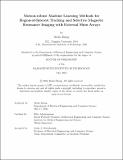Motion-robust Machine Learning Methods for Region-of-Interest Tracking and Selective Magnetic Resonance Imaging with External Shim Arrays
Author(s)
Zhang, Molin
DownloadThesis PDF (71.15Mb)
Advisor
Adalsteinsson, Elfar
Terms of use
Metadata
Show full item recordAbstract
Fetal motion during imaging presents a significant challenge, resulting in image artifacts and limiting the diagnostic information that can be obtained. Despite the adoption of fast single-shot MRI techniques, capable of acquiring images in less than a second per slice, fetal motion remains problematic, leading to noticeable artifacts between slices. These artifacts, which degrade image quality and impede accurate diagnosis, emphasize the vital necessity of implementing robust motion correction techniques in fetal MRI. This thesis presents a novel pipeline aimed at improving the robustness of fetal MRI against fetal motion. Central to this pipeline is the objective of achieving spatially selective Magnetic Resonance Imaging (MRI), focusing exclusively on the region of interest (ROI). It is crucial to emphasize that while the impetus for this thesis stems from fetal motion issues, the techniques developed herein have broader applications beyond this specific domain. The pipeline comprises three interconnected components, each addressed by a novel technique: fetal pose estimation and data augmentation with diffusion model, general optimization framework for selective imaging with time-varying shim array fields and self-supervised reconstruction method for highly under-sampled temporal related imaging. This proposed pipeline enhances the robustness to fetal motion by shortening the acquisition time.
Date issued
2024-05Department
Massachusetts Institute of Technology. Department of Electrical Engineering and Computer SciencePublisher
Massachusetts Institute of Technology